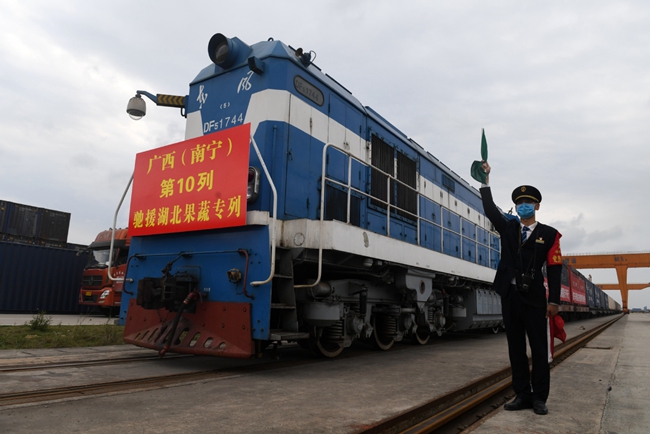Nation rallies to satisfy Hubei's appetite
By ZHAO RUIXUE in Jinan and ZHANG LI in Nanning | (China Daily )| Updated : 2020-03-27
Print Print
A freight train
leaves Nanning, Guangxi, for Xianning, Hubei, carrying 178 tons of fruit and
vegetables. [Photo/Xinhua]
Wei Xinye, general manager of a company in Yongfu county, Guilin, that produces fruit for use as a traditional medicine to treat coughs and moisten the lungs, donated 50,000 pieces of fruit.
"We had already sent 100,000 pieces to Hubei by truck. We hope our products can ease the suffering of medics and patients in the province and bring a little sweetness to their lives," Wei said.
Qin Jibing, president of the Lipu Orange Plantation Association in Guangxi, raised money to buy 50 tons of oranges from farmers.
"In this way, we can gather a large amount of oranges in a very short time and send them for quality testing all together. We want to make sure that people in Hubei who are infected with the virus can have the best fruit," said Qin, who plans to make more donations.
China is the world's largest producer of vegetables, with an annual output of more than 700 million tons. But amid the outbreak, transporting them to Hubei has been a challenge.
To ensure supplies reach the province smoothly from elsewhere in the country, five transportation stations have been set up around Wuhan.
Cao Guangjing, deputy governor of Hubei, said at a news conference late last month that goods transported to the city are unloaded at the stations and distributed to districts by logistics service providers.
More than 3,500 supermarkets and stores have been operating in Hubei during the lockdown, with group purchase and delivery services provided to residents.
Before the lockdown was imposed in Wuhan, more than 400 medium-and small-sized agricultural markets were open in the city as the main channels for vegetable sales, but most have since closed due to quarantine measures.
Three State-owned enterprises operating more than 1,100 stores have stepped in to fill the gap and have remained open for business, despite a shortage of workers and protective equipment.
In addition, the two largest agricultural trade markets in Wuhan-Baishazhou and Sijimei-are ensuring an abundant supply of vegetables for stores and supermarkets.
Qi Xin in Zhengzhou contributed to this story.

 Statistics: Fun facts about Heze's peonies
Statistics: Fun facts about Heze's peonies  Cultural hub of Jining revitalizes traditional culture
Cultural hub of Jining revitalizes traditional culture  Peonies bloom in Heze
Peonies bloom in Heze